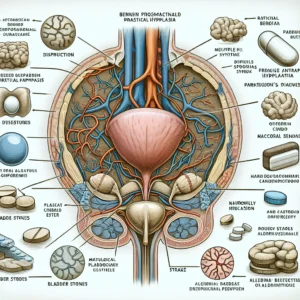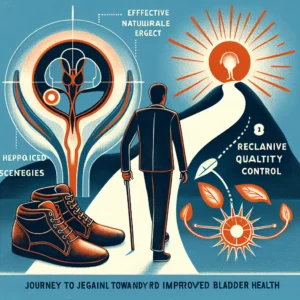Transform Your Life by Effectively Managing and Overcoming Frequent Urination Challenges
Living with the challenges posed by Overactive Bladder Syndrome (OAB) can escalate from a minor inconvenience to a significant disruption in your everyday activities. This condition can drastically impact your quality of sleep, lower your self-esteem, and even create friction in your personal relationships. If you often find yourself rushing to the restroom during the day, waking up multiple times at night, or experiencing sudden and intense urges to urinate, it’s crucial to recognize that you are not alone in this struggle. Many men face these distressing symptoms, frequently misinterpreting frequent urination as a normal part of aging. However, it is important to understand that you do not have to accept this condition as a permanent circumstance. Numerous effective treatments and strategies are available that can help you regain control over your life and improve your overall health and well-being.
Deep Dive into the Complexities of Overactive Bladder Syndrome
Overactive Bladder Syndrome (OAB) is a common condition that affects millions of individuals worldwide, yet it often remains underrepresented and inadequately discussed in health-related conversations. OAB arises from a malfunction in the communication pathways between the bladder’s nerves and its muscles, resulting in frequent and urgent urges to urinate. Unlike a urinary tract infection (UTI), which is usually a temporary ailment treatable with antibiotics, OAB is a chronic condition that demands a comprehensive approach, integrating management strategies and lifestyle modifications. A variety of factors can trigger this syndrome, including an enlarged prostate, certain neurological disorders, and dietary components that may irritate the bladder. Gaining a clear understanding of these underlying causes is essential for effective management.
Recognizing the Disturbing Symptoms Associated with Overactive Bladder Syndrome
A healthy bladder typically can comfortably hold urine for several hours; however, OAB disrupts this natural function, leading to a variety of distressing symptoms that can significantly interfere with your daily life. You may find yourself making more than eight trips to the restroom each day, often waking at night due to an urgent need to urinate, a condition referred to as nocturia, or experiencing an overwhelming, sudden urge to relieve yourself. In some cases, individuals may also suffer from urge incontinence, which can lead to uncontrollable leakage before reaching a toilet. While these symptoms might initially seem minor, they can accumulate over time, severely impairing your workplace productivity, negatively affecting social interactions, and compromising your mental health and emotional well-being.
 Exploring the Underlying Causes of Overactive Bladder Syndrome
Exploring the Underlying Causes of Overactive Bladder Syndrome
The bladder acts as a dynamic organ, depending on a complex interplay of muscle contractions and nerve signals to function optimally. Any disruption in this intricate system can lead to OAB. For many men, a frequent contributor is benign prostatic hyperplasia (BPH), which puts pressure on the bladder and prevents complete emptying. Additionally, neurological disorders such as Parkinson’s disease, multiple sclerosis, and stroke can have a significant impact on normal bladder control. Other contributing factors include bladder stones, certain medications, and high consumption of alcohol and caffeine, indicating the multifaceted nature of this challenging condition.
Evaluating the Daily Life Interruptions Resulting from Overactive Bladder Syndrome
If your daily routine is governed by the proximity of restrooms, you are likely acutely aware of how disruptive OAB can be. Beyond the discomfort linked with the condition, the consequences can permeate various aspects of life. Sleep quality may diminish due to frequent nighttime bathroom visits, while work productivity may decline as you find yourself stepping out from crucial meetings or tasks. Moreover, intimacy and sexual wellness may suffer due to feelings of embarrassment or anxiety surrounding potential leakage. Over time, these challenges can lead to feelings of anxiety, depression, and social isolation. Fortunately, practical and effective solutions exist that do not necessarily depend on invasive procedures or medications that could lead to adverse side effects.
Proven Strategies for Regaining Control Over Your Bladder Health and Life
Effectively managing OAB requires a holistic approach that transcends merely limiting fluid intake or avoiding caffeine. A comprehensive strategy centered on bladder health, nerve function, and muscle control is essential for achieving meaningful improvement. Fortunately, natural therapies, lifestyle adjustments, and alternative treatments have shown promising results in alleviating symptoms without the potential risks associated with conventional prescription medications.
Adopting a Comprehensive Holistic Approach for Successful OAB Management
Recent studies increasingly validate the effectiveness of herbal medicine, acupuncture, and personalized exercises in managing bladder dysfunction. By addressing the underlying causes rather than merely masking the symptoms, you can achieve lasting relief and empower yourself to take charge of your health journey.
 Utilizing Herbal Remedies to Support Optimal Bladder Function
Utilizing Herbal Remedies to Support Optimal Bladder Function
Nature offers a wealth of remedies to enhance urinary health. Herbal extracts like horsetail, nettles, and dandelion have been traditionally used for generations to promote healthy bladder function. Horsetail serves as a natural diuretic, helping to reduce fluid retention while strengthening bladder tissue. Nettles possess anti-inflammatory properties that support prostate health, making them particularly beneficial for men dealing with OAB related to BPH. Additionally, dandelion root aids in urinary tract health by flushing out toxins and improving kidney function. When taken in micro-encapsulated daily doses, these herbal remedies can provide consistent support without the adverse effects commonly associated with synthetic medications.
Implementing Acupuncture Techniques to Enhance Bladder Control
The principles of Traditional Chinese Medicine underscore the significance of energy flow in maintaining optimal organ function. Acupuncture, which entails the strategic insertion of fine needles into specific points on the body, has been shown to effectively regulate bladder activity. Research suggests that acupuncture can enhance bladder control by calming overactive nerves and strengthening pelvic floor muscles. Over time, this practice may lead to reduced urges, increased bladder capacity, and improved sleep quality.
Strengthening Your Pelvic Floor Muscles for Superior Bladder Control
Weak pelvic muscles can significantly contribute to the symptoms associated with OAB. Targeted pelvic floor exercises, commonly known as Kegel exercises, can effectively strengthen these muscles, resulting in better bladder control. Unlike high-impact workouts that may exacerbate urinary issues, Kegel exercises are discreet, can be performed in a variety of settings, and are incredibly effective. Regular practice not only helps prevent leakage but also reduces the sudden urgencies that characterize OAB, thereby significantly enhancing your quality of life.
Embracing Transformative Lifestyle Changes for Long-Lasting Improvements
If OAB is adversely affecting your quality of life, it’s essential to reassess your daily habits. Reducing your intake of caffeine, alcohol, and artificial sweeteners can lead to meaningful improvements, as these substances are known irritants to the bladder lining. Staying adequately hydrated is crucial, but the timing of fluid intake is also vital—consider hydrating earlier in the day and minimizing liquid consumption in the evening to reduce nighttime restroom visits. Moreover, managing stress effectively is crucial, as anxiety can trigger bladder spasms and worsen symptoms. Engaging in deep breathing exercises, meditation, and mindfulness practices can help calm the nervous system and improve bladder control.
 Take Charge of Your Bladder Health and Transform Your Life Today
Take Charge of Your Bladder Health and Transform Your Life Today
Living with OAB should not dictate your quality of life. By implementing the right strategies, you can regain control over your bladder, boost your confidence, and enhance your overall quality of life. If you’re prepared to explore natural therapies, acupuncture, and personalized guidance tailored to your unique needs, now is the perfect time to take action. There’s no need to endure discomfort silently when effective solutions are readily accessible.
Your Questions Answered: Commonly Asked Questions About OAB
What are the primary triggers of Overactive Bladder in men?
The occurrence of Overactive Bladder in men is often associated with prostate enlargement, nerve dysfunction, bladder irritation, and various lifestyle factors. Certain medications and pre-existing health conditions can also contribute to the emergence of symptoms.
How can I differentiate between OAB and simple excessive fluid intake?
The hallmark symptoms of OAB include frequent urination, sudden urgency, and nighttime awakenings, regardless of your fluid consumption levels. If reducing your water intake does not alleviate these symptoms, it likely indicates an underlying bladder dysfunction rather than mere overhydration.
Are herbal treatments effective for improving bladder control?
Indeed, herbal remedies such as horsetail, nettles, and dandelion have a historical precedent for enhancing urinary health. When utilized in appropriate dosages and forms, these remedies can help alleviate urgency, strengthen bladder tissue, and improve control over urinary functions.
Can acupuncture genuinely relieve symptoms of OAB?
Clinical studies indicate that acupuncture can effectively regulate bladder activity, diminish urgency, and strengthen pelvic muscles. Many individuals report significant improvements in their symptoms following a consistent regimen of acupuncture treatments.
Is experiencing OAB a normal part of aging?
While changes in bladder function may occur with age, OAB is not an unavoidable aspect of the aging process. Symptoms can be effectively managed through suitable lifestyle adjustments, natural treatments, and professional support.
What lifestyle modifications can assist in alleviating OAB symptoms?
Reducing your intake of caffeine, alcohol, artificial sweeteners, and spicy foods can significantly lessen bladder irritation. Strengthening pelvic muscles, managing stress levels, and ensuring adequate hydration (with thoughtful timing of fluid intake) are also effective strategies for regulating bladder activity.
When should I seek professional help for OAB?
If frequent urination disrupts your sleep, interferes with your daily activities, or causes feelings of embarrassment, it’s crucial to seek professional assistance. You do not have to suffer in silence—numerous effective solutions are available to help you manage your symptoms.
Presented By: Comprehensive Treatment for Overactive Bladder
Join Us on Facebook
The Article: Overactive Bladder Syndrome: Essential Insights You Need to Know first appeared on https://mcrtherapies.co.uk
The Article Overactive Bladder Syndrome: Important Information You Should Be Aware Of appeared first on https://mcrtherapies.com
The Article Overactive Bladder Syndrome: Key Insights You Should Know Was Found On https://limitsofstrategy.com
This post resonates deeply with me, as I’ve seen how Overactive Bladder Syndrome can affect not just the individual, but also their social dynamics and mental health. My close friend has been grappling with OAB for years, and it’s eye-opening to see the way it has influenced his confidence and relationships.